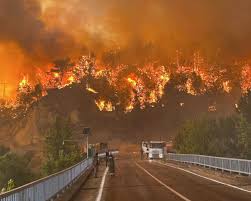A distinguished Turkish news service reports that Türkiye is contending with widespread and life‑threatening wildfires across multiple provinces, fuelled by an intense Mediterranean heatwave combined with strong gusts and bone‑dry conditions.
In the provinces of Bursa and Karabük, major fires forced the evacuation of 1,765 and 1,839 residents respectively. In Bursa alone, the wildfire scorched over 3,000 hectares and claimed the life of a firefighter, while in Karabük the fires have persisted for five straight days despite efforts by planes and helicopters to bring them under control
Across the country, more than 3,600 people have been moved to safety, helped by a force of around 2,000 firefighters, six firefighting aircraft, and four helicopters
President Recep Tayyip Erdoğan has characterised the situation as “a truly great disaster” as authorities declared disaster zones in İzmir and Bilecik, where flames have damaged over 300 homes
Notably, Antalya recorded its highest-ever July temperature of 46.1 °C, and southeastern Turkey saw peaks near 50 °C, unprecedented in the nation’s climate records
The wave of wildfires in Türkiye follows an early summer heatwave sweeping across southern and western Europe. In France, Greece, Spain, Portugal and Italy, temperatures soared above 40 °C, triggering orange and red heat alerts and prompting widespread evacuations and safety warnings
Greece has seen over 50 wildfires erupt nationwide, with regions like Evia, Crete, Chania, and Kythira evacuated or declared on high fire alert. In Evia alone, residents and firefighters suffered injuries from smoke inhalation and burns while battling these blazes
France’s Aude and Corbières regions saw fires burn through hundreds of hectares, forcing the evacuation of campsites and heritage sites—fire alerts remained active across 84 of its departments
In Spain and Portugal, temperatures reached up to 44 °C, especially in Andalusia and Extremadura, with authorities warning of heightened fire danger and extreme health risks
Experts and climate scientists warn that these destructive fires and relentless heatwaves reflect the growing impact of climate change, which has amplified fire weather in the region. Conditions such as strong winds, drought and desert-level humidity, coupled with unusually high temperatures, have turned even small sparks into raging infernos
As the crisis endures, authorities continue to urge citizens to avoid non-essential travel, limit outdoor activities during peak heat hours, and observe evacuation protocols where issued. Health agencies across Europe have also issued dire public safety notices, highlighting heat-related illnesses among the elderly, children and other vulnerable group
The situation remains volatile across Türkiye and Europe, as firefighting operations persist and heatwave conditions show no immediate sign of abating, leaving communities on edge and local infrastructures severely strained.
